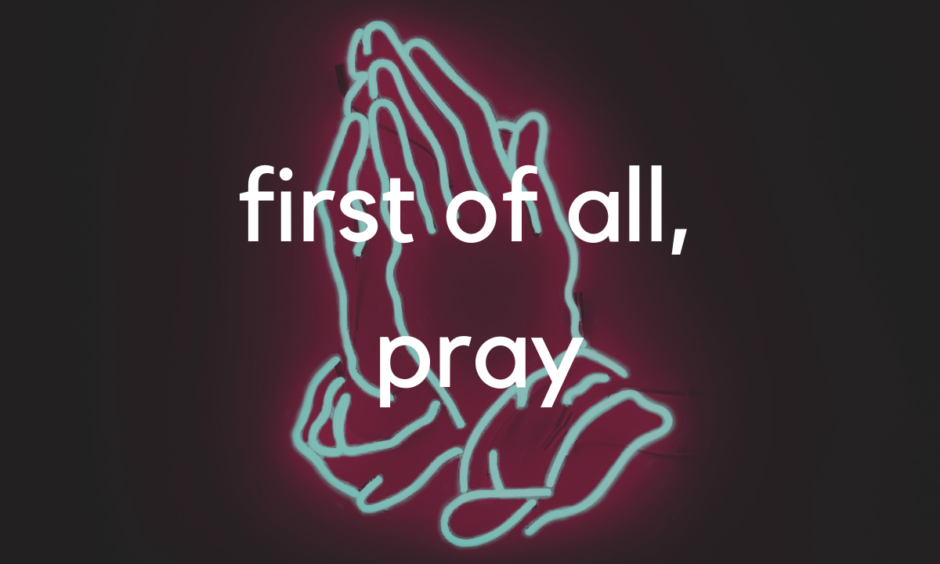I’ve written before about how we’re living in the age of opinion, where the average person feels the need to express their opinion about nearly everything. While opinions and their expression certainly aren’t bad, they’re also not particularly helpful, especially in a climate where we tend to be so settled in our opinion-tribes that outside information is generally ignored or ridiculed. Pew Research found that only 14% of people say their minds were changed by something the saw on social media, yet still opinions abound.
As Christians, ought we prioritize making our point and expressing our opinion? I don’t think so, and it doesn’t seem like the Apostle Paul thought so either. Instead of debating and making sure our views are heard in the civil circle, the Christian’s prime response to the division and confusion in the world must be powerful prayer.
1 Timothy 2:1-7
“First of all, then, I urge that supplications, prayers, intercessions, and thanksgivings be made for all people, for kings and all who are in high positions, that we may lead a peaceful and quiet life, godly and dignified in every way. This is good, and it is pleasing in the sight of God our Savior, who desires all people to be saved and to come to the knowledge of the truth. For there is one God, and there is one mediator between God and men, the man Christ Jesus, who gave himself as a ransom for all, which is the testimony given at the proper time. For this I was appointed a preacher and an apostle (I am telling the truth, I am not lying), a teacher of the Gentiles in faith and truth.”
First of all, pray
When you encounter opposing opinions or just plain opposition, what’s your first response? For me it’s often to pull back, analyze the situation, and try to think out my best way forward. But according to Paul, we ought to “first of all” pray. Prayer should be the priority of a person of faith because we believe God’s power is far greater than ours.
In Philippians 4:6 Paul emphasizes this point when he writes, “Do not be anxious about anything, but in every situation, by prayer and petition, with thanksgiving, present your requests to God.” (NIV). Prayer is far more effective than an opinion expressed or a situation evaluated with our analytical powers.
Even though the world often mocks promises of prayer for hard situations such as nightclub shootings, Paris bombings, or pandemics, we must not buy into that mindset. A low view of prayer is a low view of God. A high view of prayer is a high view of God and insists that we must, first of all, pray. But not just the quick, top-of-the-head, throw up a thought to heaven kind of prayer.
Pray with power
I urge that supplications, prayers, intercessions, and thanksgivings be made for all people
Note the repetition in the phrase above. Paul uses four different words for prayer as a way of emphasizing the intensity with which we ought to pray as well as the nuanced types of prayer that he has in mind for Timothy and God’s people.
The kind of prayer Paul has in mind isn’t a casual, quick thing. It is a full-on determined wrestling of the soul. Supplication. Prayers. Intercession. Thanksgiving. Each with their unique focus, all with an unrestrained passion.
Supplication means laying our own requests before God, asking for his hand to work. Prayers, I believe, refers to memorized or written prayers, such as praying the Psalms or the Lord’s prayer. Intercession is the passionate plea for another, coming before God on their behalf. Thanksgiving is, obviously, the practice of telling God in prayer what you are thankful for.
We can leverage each of these four types of prayer to begin to pray with power. How? It’s not complex or challenging. Simply;
Learn to pray with power
- Start practicing regularly – set aside a specific time, ideally the start of your day, to pray for 5-10 minutes.
- Start praying with specificity – identify specific things in your life to ask God for, to intercede for, and to thank God for. The more detailed you can be, the better. Generalities make for generally passionless prayer.
- Start praying with honesty – Passion in prayer dies when we aren’t being authentic before the Lord. Pray honestly, telling Him your frustrations with Him and your true needs, not what you think you should need as a “good Christian.”
Pray first, and pray with power. That’s what Paul believes we should prioritize. He’s specific about how we pray, and he’s specific about who we should pray for as well.
For those in power
for all people, for kings and all who are in high positions,
Firstly, we are to pray for all people. All people. That means there are none off limits in our prayers. Praying with specificity doesn’t mean praying with a small scope. We are to pray for people in close proximity to use, both relationally and physically, as well as those who are far from us. Enemies and friends. Neighbors and those in distant lands. Pray for all people.
And also, pray for those in power. Why does Paul call out this specific group? Aren’t people in power include in “all people”? Here’s why I believe he specifically names those in power: the human default is to vilify those who are in power. Paul wants to ensure that we follow Christ’s example and love those who others vilify through praying for them.
This is a potent reminder for those in 2019 America. If Paul’s words are true, then we ought to pray fervently for the people who hold political offices in our country, regardless of whether we agree with them or not. Before we express our opinions against or for them, first of all, we must pray.
For the sake of quiet living
that we may lead a peaceful and quiet life, godly and dignified in every way
What’s the end goal of this praying? It’s not what a modern person – at least one in my generation – would expect. The goal of this praying is that we lead a peaceful and quiet life. This goes directly against the modern narrative that everyone who follows Jesus should aspire to be a world changer. People who live peaceful, quiet, and dignified lives aren’t seen as big and glamorous world changers. Let’s be honest. Most of us aren’t world-changers. In fact, none of us are. Jesus is the only real world changer.
But we live in a world where the is incredible pressure to be something grander than we are. In Christian culture radical impact is equated with true faithfulness. Not so in Paul’s mind. His desire for Timothy and those who he led was simply that they have peaceful, quiet, Godly, and dignified lives.
My friends, let’s take the pressure off of ourselves. Be released from the need to express your every opinion and prove yourself right. Be released from the pressure to make a huge impact and be a world-changer. Step back. Take a deep breath. You don’t have to transform anything.
Your job is simply, first of all, to pray. Be present with the Father, listen to the Spirit, follow the Son. Pray with the power of God with you, for those who are close to you and those who are far. And for those who are in power. As you do so, may God grant that you lead a life that is full of supernatural peace, the quiet and lasting goodness of Jesus’ grace, godly and free from sin, dignified and dignity-giving in every way.





No Comments